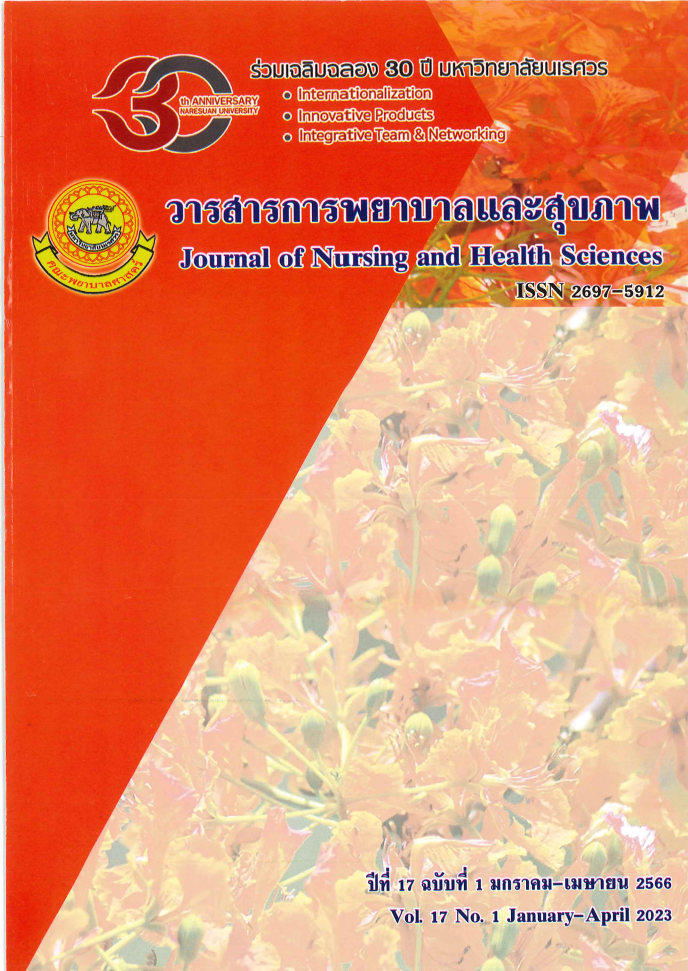Factors Predicting Childbirth Preparation Information Seeking Behavior among Pregnant Women
Main Article Content
Abstract
Childbirth preparation information seeking behavior is significant factor affecting on the ability in childbirth preparation. This study aimed to explore factors predicting childbirth preparation information seeking behavior among pregnant women. The participants were 143 pregnant women who received antenatal care at Queen Savang Vadhana Memorial hospital. Data were collected by self-report questionnaires including demographic data, attitudes towards childbirth, perceived benefits of vaginal birth, subjective norms, information source characteristics, perceived self-efficacy in health information, and childbirth preparation information seeking behavior. Reliabilities of questionnaires were .84, .92, .96, .94, .80 and .85 respectively. Descriptive statistics and multiple regression were used to analyze the data.The result found that an average score of childbirth preparation information seeking behavior was 28.11 (SD = 6.19) The significant predicting factors of childbirth preparation information seeking behavior included information source characteristics (β = .311) and perceived self-efficacy in health information (β = .277). The percentage of total variance explained by these factors among pregnant women was 29.9 (R2= .299) The findings suggested that midwives and other health care providers should improve health resources on childbirth preparation that focus on quality of health information, information access, and several communication channels. In addition, perceived self-efficacy in health information should be promoted for pregnant women.
Article Details

This work is licensed under a Creative Commons Attribution-NonCommercial-NoDerivatives 4.0 International License.
References
Anusornteerakul, S., & Kittiprisada, P. (2013). The effects of health education program and relative assistant on pain, fear, anxiety in primiparous during the first stage of labor. Journal of Nursing Science & Health, 36(1), 23-31.[In Thai].
Akhther, N., & Sopory, P. (2022). Seeking and sharing mental health information on social media during COVID-19:Role of depression and anxiety, peer support, and health benefits. Journal of technology in behavioral sciences, 7(2), 211-226. https://doi.org/10.1007/s41347-021-00239-x.
Bamoriya, H., & Singh, R. (2011). Attitude towards advertising and information seeking behavior – a structural equation modeling approach. European Journal of Business and Management, 3(3),45-54.
Bandura, A. (1977). Self-efficacy: Toward a unifying theory of behavioral change. Psychological Review, 84(2),191-215.
Charoensanti, J. (2017). Nursing and midwifery: Antenatal. Chiangmai: Siampimnana. [In Thai].
Chen, J., Hou, X., & Zhao, W. (2016). Research on the model of consumer health information seeking behavior via social media. International Journal of Communications, Network and System Sciences, 9(8), 326-337.Dick-Read, G. (1984). Childbirth without fear. New York: Harpe & Row.
Gao, L. L., Larsson, M., & Luo, S. Y. (2013). Internet use by Chinese women seeking pregnancy-related information. Midwifery, 29(7), 730-735. https://doi.org/10.1016/j.midw.2012.07.003.
Groot, M. J. A. M. (2010). Playing doctor: the risks of seeking health-information on the internet. Retrieved 20 January 2020 from https://1library.net/document/zpnr880y-playing-doctor-risks-seeking-health-information-internet.html.
Gustafson, D. H., McTavish, F. M., Stengle, W., Ballard, D., Hawkins, R., Shaw, B. R., … Landucci, G. (2005). Use and impact of eHealth system by low-income women with breast cancer. Journal of health Communication, 10(Suppl 1), 195-218.https://doi.org/10.1080/10810730500263257.
Jaiborisuttikul, S., Suppasri, P., & Tachasuksri, T. (2017). Factors influencing elective cesarean section intention among primigravida women. Journal of Nursing science and Health, 40(1), 53-62. [In Thai].
Junjongkon, N., Konbamrung, D., & Khoka, A. (2021). Health promoting behaviors of pregnant women attending antenatal clinic at Banmanik and Si Sunthon subdistrict health promotion hospital in Thalang district, Phuket province between June and July 2020. Bulletin of the department of medical sciences, 63(2), 287-300. [In Thai].
Kuttasing, S., Deoisres, W., & Siriarunrat, S. (2019). Factors related to perceived childbirth self-efficacy in primiparous
pregnant women. The Journal of Faculty of Nursing Burapha university, 27(2), 104-114. [In Thai].
Leelatiwanon, T., Chunuan, S., & Youngwanichsetha. (2018). Factors influencing eating behaviors among teenage
pregnant women. Princess of Naradhiwas University Journal, 10(2), 25-37. [In Thai].
Lwoga, E. T., Nagu, T., & Sife, A. S. (2017). Online HIV information seeking behaviour among people living with HIV in selected Tanzanian public hospitals. Journal of Systems and Information Technology, 19(2), 94-115.
Permsub, N., Sawatphanit, W., & Deoisres, W. (2017). Effect of childbirth preparation on fear of childbirth, labour pain coping behaviors, and satisfaction with childbirth experience in primiparous at a hospital under jurisdiction of Royal Thai Navy. Royal Thai Navy Medical Journal, 44(2), 55-72. [In Thai].
Polit, D., & Hungler, B. (2008). Essential of nursing research: Methods appraisal and utilization. Lippincott: New York.
Schmidt, H., Wild, E. M., & Schreyögg, J. (2021). Explaining variation in health information seeking behaviour - Insights
from a multilingual survey. Health policy (Amsterdam, Netherlands), 125(5), 618-626. https://doi.org/10.1016/
j.healthpol.2021.01.008.
Shieh, C., McDaniel, A., & Ke, I. (2009). Information-seeking and its predictors in low-income pregnant women. Journal
of midwifery & women’s health, 54(5), 364-372. https://doi.org/10.1016/j.jmwh.2008.12.017.
Shieh, C., Broome, M. E., & Stump, T. E. (2010). Factors associated with health information-seeking in low-income
pregnant women. Women & health, 50(5), 426-442. https://doi.org/10.1080/03630242.2010.506152.
Surinprateep, P., Ratinthorn, A., & Limruangrong, P. (2019). Factors influencing pregnant women’s seeking of health
information. Journal of Thailand Nursing and Midwifery Council, 34(4), 95-107. [In Thai].
Tachasuksri, T., Siriarunrat, S., Suppasri, P., Suppaseemanont, W., Boonnate, N., & Kwannate, C. (2017). Causal model
for quality of life among pregnant women. The Southern college network Journal of Nursing and Public Health,
(1), 28-46. [In Thai].
Wang, J., Xiu, G., & Shahzad, F. (2019). Exploring the determinants of online health information-seeking behavior using a meta-analytic approach. Sustainability, 11(17), 4604. https://doi.org/10.3390/su11174604.
Wijayanti, R. P., Handayani, P. W., & Azzahro, F. (2022). Intention to seek health information on social media in Indonesia. Procedia Computer Science, 197(2022), 118-125.
Wilson, T. D. (1997). Information behavior: An interdisciplinary perspective. Information Processing & Management, 33(4), 551-572.
Wilson, T. D. (1999). Models in information behavior research. Journal of Documentation, 55(3). 249-270.
Zhao, S., & Liu, Y. (2021). The more insufficient, the more avoidance? Cognitive and affective factors that relates to information behaviours in acute risks. Frontier in psychology, 12, 730068. https://doi.org/10.3389/fpsyg.2021.730068.


